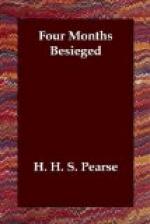In the early days of the year the Boer batteries became much more active. We shall see that they were preparing for a climax, which, however, by the splendid bravery and determination of the garrison, was to be turned into one of disaster for the enemy rather than for the defenders. We are now within three days of the hottest ordeal Sir George White and his gallant army had to pass through. Happenings in the short interval are thus described in Mr. Pearse’s notes:—
January 3.—For two days the Boer fire from Bulwaan has been directed mainly at the Town Hall or buildings near it, with occasional diversions towards the Intelligence Offices on one side, or the Indian Ordnance Laager on the other. Within these limits of deviation are the busiest parts of Ladysmith, bakeries for the supply of all who are invested, depots at which civilians assemble to draw their daily rations beside the Market Square, where lank-sided dogs snarl over refuse, and such stores as have still something to sell that has not been requisitioned for military uses. The Royal Hotel seems to be a mark once more. Several shells have come near hitting it to-day, and not twenty yards from the room in which I am making these notes a shrapnel has just burst through the wall of a stable. One horse standing there seems to be badly wounded, but curiously enough hardly shows any signs of terror, though the explosion close to him must have sounded terrific, and he was half blinded by dust mingled with fumes of melinite. The fact that Boers use high explosives for bursting charges has been questioned, but this shrapnel, and others I have seen burst at close quarters, undoubtedly contained melinite or some similar villainous compound, to which our own lyddite is near akin. A little later two ladies were driving down the main street when a shell burst just in front of their trap. The pony swerved as if to bolt, but his driver pulled him up with a steady hand and soothed him without a tremor in her voice. At the next corner, fully exposed to Bulwaan’s battery, these ladies stopped, waiting to watch the effect of another shot.
It must not be thought that our own guns, though seldom mentioned, are idle all this while. They do not waste ammunition, for a very good reason, but wait their opportunity for effective reply to the enemy’s batteries, and when a naval 12-pounder or the “Lady Anne” comes into action the Boer fire is apt to be hurried and wildly inaccurate if it does not cease for a time. The Boers have however mounted a new gun near Pepworth’s, which sends “sneakers” into town and about Mount Hill with irritating persistency, and its smokeless powder makes a flash so small that the exact position cannot be located.




